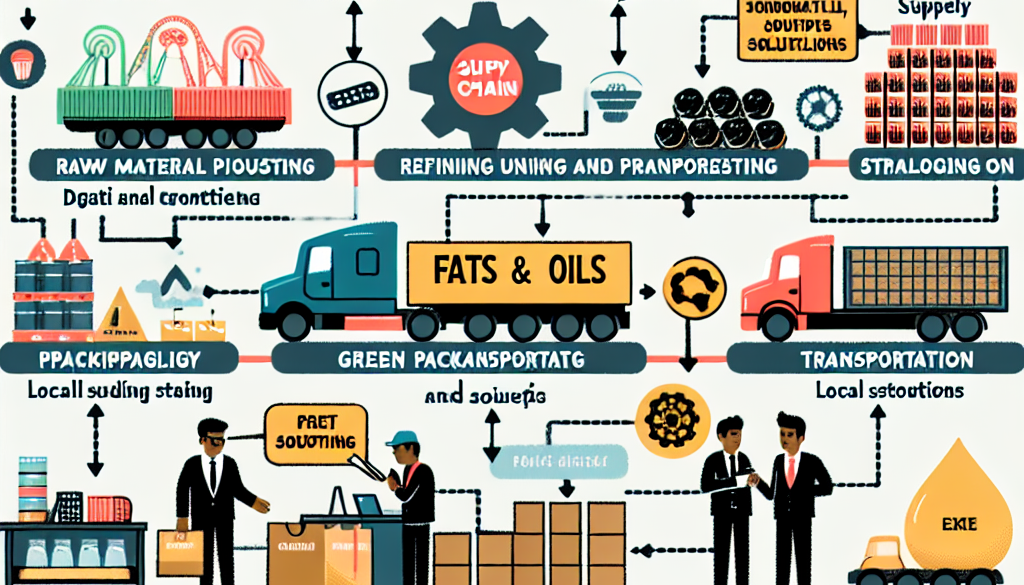Solutions to Fats and Oils Supply Chain Difficulties
-
Table of Contents
- Strategies to Overcome Fats and Oils Supply Chain Challenges
- Understanding the Supply Chain Issues
- Implementing Technological Advancements
- Strengthening Supplier Relationships
- Optimizing Logistics and Transportation
- Adapting to Regulatory Changes and Trade Barriers
- Meeting Consumer Demand for Sustainability
- Conclusion: Key Takeaways for a Resilient Supply Chain
- ETprotein: Your Partner for High-Quality Protein Products
Strategies to Overcome Fats and Oils Supply Chain Challenges

The global supply chain for fats and oils is a complex network that is essential for the production of a wide range of products, from food to cosmetics. However, this supply chain faces numerous challenges, including fluctuating commodity prices, transportation bottlenecks, and geopolitical tensions. In this article, we will explore various solutions to these difficulties, providing valuable insights and statistics to help stakeholders navigate the complexities of the fats and oils market.
Understanding the Supply Chain Issues
Before delving into solutions, it’s crucial to understand the root causes of supply chain disruptions in the fats and oils industry. Some of the primary issues include:
- Climate change impacting crop yields
- Geopolitical conflicts affecting trade routes
- Transportation inefficiencies and costs
- Regulatory changes and trade barriers
- Consumer demand shifts towards sustainable sources
These challenges can lead to increased prices, reduced availability, and quality concerns, affecting everyone from producers to end consumers.
Implementing Technological Advancements
One of the most effective ways to address supply chain difficulties is through the adoption of new technologies. Innovations such as blockchain for traceability, artificial intelligence for demand forecasting, and the Internet of Things (IoT) for real-time monitoring can significantly enhance efficiency and transparency.
- Blockchain: By creating a secure and immutable ledger of transactions, blockchain can help ensure the authenticity and sustainability of sourced oils and fats.
- Artificial Intelligence: AI can analyze vast amounts of data to predict market trends and optimize inventory management, reducing waste and shortages.
- IoT: IoT devices can monitor storage conditions and transportation environments, ensuring product quality throughout the supply chain.
Strengthening Supplier Relationships
Building strong partnerships with suppliers is essential for a resilient supply chain. Companies should invest in long-term relationships, collaborate on sustainability initiatives, and develop contingency plans for potential disruptions.
- Collaborative Planning: Working closely with suppliers to forecast demand and plan production can help prevent bottlenecks.
- Sustainability Initiatives: Joint efforts to promote sustainable farming practices can ensure a stable supply of raw materials.
- Risk Management: Identifying and mitigating risks through diversified sourcing and inventory strategies can protect against unforeseen events.
Optimizing Logistics and Transportation
Transportation is a critical component of the fats and oils supply chain. Companies can optimize logistics by:
- Utilizing multimodal transportation to reduce dependency on any single mode of transport
- Investing in more efficient routing software to minimize delays and fuel consumption
- Exploring local sourcing options to shorten supply chains and reduce transportation costs
Additionally, partnerships with reliable logistics providers can help navigate regulatory changes and customs procedures more effectively.
Adapting to Regulatory Changes and Trade Barriers
Regulatory changes and trade barriers can have a significant impact on the fats and oils supply chain. Companies must stay informed about international trade agreements and adjust their sourcing strategies accordingly. This may involve:
- Engaging with industry associations to advocate for favorable trade policies
- Exploring alternative markets to diversify sources and mitigate risks
- Ensuring compliance with all regulatory requirements to avoid costly penalties and delays
Meeting Consumer Demand for Sustainability
Consumers are increasingly demanding sustainable and ethically sourced products. Companies can respond by:
- Investing in sustainable farming practices and certifications
- Developing transparent labeling to inform consumers about the origin and production methods of fats and oils
- Offering products that align with consumer values, such as organic or non-GMO options
By addressing consumer concerns, companies can build brand loyalty and secure a competitive advantage in the marketplace.
Conclusion: Key Takeaways for a Resilient Supply Chain
In conclusion, the fats and oils supply chain faces numerous challenges, but there are several strategies that companies can employ to overcome these difficulties. By embracing technological advancements, strengthening supplier relationships, optimizing logistics, adapting to regulatory changes, and meeting consumer demand for sustainability, stakeholders can build a more resilient and efficient supply chain. These solutions not only address current issues but also prepare companies for future disruptions, ensuring long-term success in the fats and oils industry.
ETprotein: Your Partner for High-Quality Protein Products
In addition to addressing supply chain challenges for fats and oils, companies should also consider the benefits of partnering with reputable suppliers for related products, such as proteins. ETprotein is a leading manufacturer and supplier of organic bulk vegan proteins and L-(+)-Ergothioneine (EGT), offering a range of high-quality products that cater to various industries. Their commitment to non-GMO, allergen-free, and high-purity ingredients makes them an ideal partner for businesses looking to enhance their product offerings with sustainable and ethical protein solutions.
About ETprotein:
ETprotein, a reputable protein and L-(+)-Ergothioneine (EGT) Chinese factory manufacturer and supplier, is renowned for producing, stocking, exporting, and delivering the highest quality organic bulk vegan proteins and L-(+)-Ergothioneine. They include Organic rice protein, clear rice protein, pea protein, clear pea protein, watermelon seed protein, pumpkin seed protein, sunflower seed protein, mung bean protein, peanut protein, and L-(+)-Ergothioneine EGT Pharmaceutical grade, L-(+)-Ergothioneine EGT food grade, L-(+)-Ergothioneine EGT cosmetic grade, L-(+)-Ergothioneine EGT reference grade and L-(+)-Ergothioneine EGT standard. Their offerings, characterized by a neutral taste, non-GMO, allergen-free attributes, with L-(+)-Ergothioneine purity over 98%, 99%, cater to a diverse range of industries. They serve nutraceutical, pharmaceutical, cosmeceutical, veterinary, as well as food and beverage finished product distributors, traders, and manufacturers across Europe, USA, Canada, Australia, Thailand, Japan, Korea, Brazil, and Chile, among others.
ETprotein specialization includes exporting and delivering tailor-made protein powder and finished nutritional supplements. Their extensive product range covers sectors like Food and Beverage, Sports Nutrition, Weight Management, Dietary Supplements, Health and Wellness Products, and Infant Formula, ensuring comprehensive solutions to meet all your protein needs.
As a trusted company by leading global food and beverage brands and Fortune 500 companies, ETprotein reinforces China’s reputation in the global arena. For more information or to sample their products, please contact them and email sales(at)ETprotein.com today.














